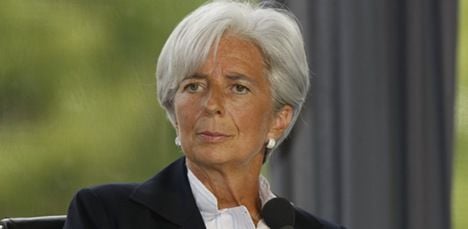China said on Wednesday the race to lead the IMF was “open”, echoing a noncommittal stance by India towards French front-runner Christine Lagarde as she pursued a tour of the emerging Asian giants.
The French finance minister, seeking to be the International Monetary Fund’s first female managing director, travelled to Beijing overnight from New Delhi, where a day of talks with Indian leaders did not yield any public endorsement.
China, India and other emerging nations have baulked at Europe’s traditional lock on the top job at the Washington-based IMF, calling the arrangement outdated, so their support is seen as key to the success of Lagarde’s bid.
Lagarde held a marathon day of talks, meeting Foreign Minister Yang Jiechi, central bank governor Zhou Xiaochuan and Vice Premier Wang Qishan, China’s top official on financial affairs, a French embassy official told AFP.
The French minister, a 55-year-old former international lawyer, then held a dinner meeting with Finance Minister Xie Xuren.
“We had a good discussion. She explained to me the purpose of her candidacy. I listened very carefully,” Yang told reporters after his meeting with Lagarde at a government compound in Beijing where foreign dignitaries are often hosted.
“It’s an open field now. There are quite a few people campaigning,” he said in English.
“China of course gives serious thought to this very important issue.”
Earlier, Lagarde said: “It was very important for me to come explain the purpose of my candidacy to the Chinese authorities.”
Lagarde is seen as the frontrunner to replace Dominique Strauss-Kahn, who resigned last month after his arrest on sexual assault charges. He pleaded not guilty in a New York court on Monday to the attempted rape of a hotel maid.
Two weeks ago, France’s chief government spokesman Francois Baroin said China – the world’s second-largest economy – was “favourable to the candidacy of Christine Lagarde”, but did not offer any evidence to back up his statement.
China’s foreign ministry subsequently said the choice of a new IMF chief should be based on “openness, transparency and merit, and better represent emerging markets and better reflect changes in the world economic structure”.
Senior officials in China, who have known Lagarde for seven or eight years, have appreciated her “distinguished qualities” both in the context of bilateral ties and the G20, chaired this year by France, a source in her entourage said.
Lagarde – who has already visited Brazil, another major emerging economy – has pledged to reform the IMF to give emerging and developing countries more power.
Indian Finance Minister Pranab Mukherjee said Tuesday after meeting Lagarde that the choice of an IMF chief should be based on “merit” and “competence”.
He added that talks with Brazil, Russia, China and South Africa – who make up the so-called BRICS bloc along with India – aimed at agreeing on a joint candidate were continuing.
Lagarde said she had not gone to India “seeking assurance or reassurance” but simply to present her candidacy and “listen to the concerns” of an important emerging-market economy.
“It would be premature and arrogant on my part to expect assurance or reassurance,” she said in New Delhi.
Lagarde was to give a news conference on Thursday in Beijing before heading on Friday to Lisbon, where African finance ministers and central bankers will be meeting for the African Development Bank’s annual gathering.
The only other serious IMF contender, Mexico’s central bank chief Agustin Carstens, visited Canada on Tuesday and was to head to India on Friday on a tour that has already seen him stop off in Brazil and Argentina.
The deadline for nominations is on Friday, leaving little time for anyone else to emerge.



 Please whitelist us to continue reading.
Please whitelist us to continue reading.
Member comments